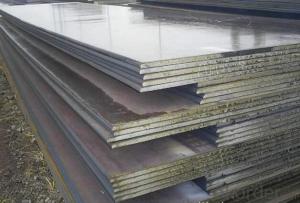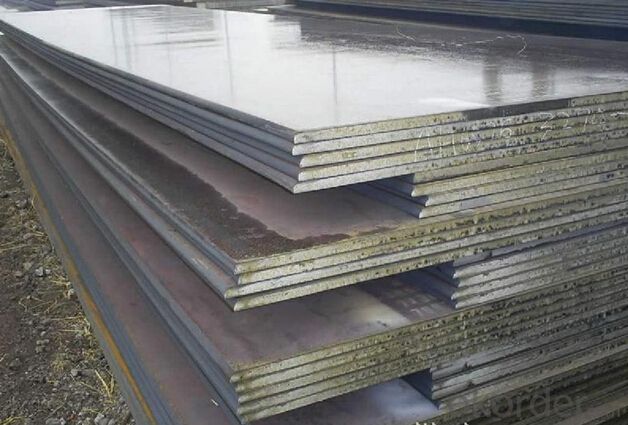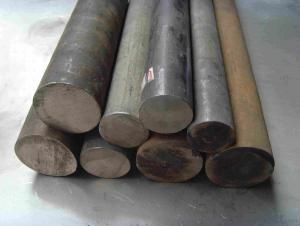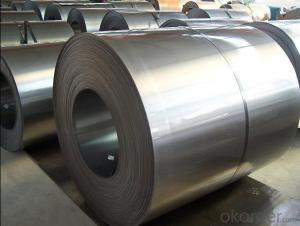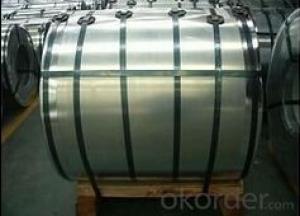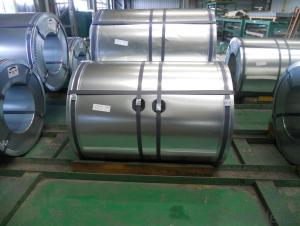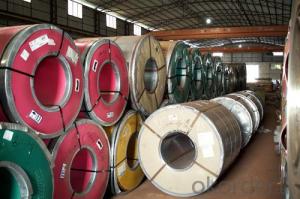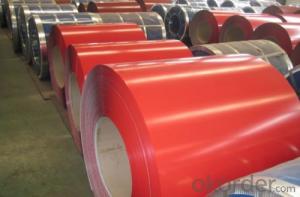Galvanized Steel Coil Galvanized Steel Sheet GI
- Loading Port:
- Tianjin
- Payment Terms:
- TT OR LC
- Min Order Qty:
- 5 m.t.
- Supply Capability:
- 10000 m.t./month
OKorder Service Pledge
OKorder Financial Service
You Might Also Like
Specification
Galvanized Steel Coil Galvanized Steel Sheet GI
Specification of the Galvanized Steel Coil Galvanized Steel Sheet GI
| NAME | PPGI | GALVANIZED | GALVALUME/ZINCALUME |
| CERTIFICATE | ISO9001:2008 | ||
| STANDARD | EN10142 JIS G3302 GB/T-12754-2006 | ASTM A653M JIS G3302 GB/T2518 EN 10142 | ASTM A792M JIS G3321 JIS G3317 EN 10215 |
| GRADE | CGCC CGCH CGCD1-CGCD3 CGC340-CGC570 | DX51D+Z/DX52D+Z/S250GD+Z S300GD+Z/S350GD+Z/S550GD+Z SGCC/SGCH/SGCD1-SGCD3/SGC340-SGC570 G2+Z/G3+Z/G250+Z/G300+Z G350+Z/G550+Z | DX51D+AZ/DX52D+AZ/S250GD+AZ S300GD+AZ/S350GD+AZ/S550GD+AZ SGLCC/SGLCD/SGLC300-SGLC570 G2+AZ/G3+AZ/G250+AZ/G300+AZ G350+AZ/G550+AZ |
| COATING | RAL COLOURS | Z60g/m2 to Z275g/m2 | AZ30g/m2 to AZ150g/m2 |
| SIZE | (0.13mm-1.5mm)X1000mm OR as requirements | (0.13mm-4.0mm)X1500mm OR as requirements | (0.12mm-4.0mm)X1500mm OR as requirements |
| TYPE | Steel coil Steel sheets/plates Corrugated steel sheets/plates | Steel coil Steel sheets/plates Corrugated steel sheets/plates | Steel coil Steel sheets/plates Corrugated steel sheets/plates |
| TECHNIQUE | Hot rolled-cold rolled -galvalume /galvanized -PPGI/PPGL | Hot rolled-cold rolled -galvanized | Hot rolled-cold rolled -galvalume /Aluzinc |
| SURFACE TREATMENT | Mini/regular/big/zero spangle,Chromate treatment /chromate-free treatment /untreated unoile/oiled, TENSION LEVELLER SKIN PASS anti-fingerprint/un-anti-fingerprint, Coating,color | Mini/regular/big/zero spangle,Chromate treatment /chromate-free treatment /untreated unoile/oiled,TENSION LEVELLERT SKIN PASS anti-fingerprint/un-anti-fingerprint,Coating | |
| APPLICATION | Structural use ,roofing, commercial use, household appliance, industry, family Roofs and outside walls of civilian and industrial buildings, garage doors, fencings and window blinds; Outer clad sheets for washing machine, refrigerator, televi-sion, air conditioner and ventilation system, explosion-proof strip, solar water heater and appliance parts; Muffler, heat shields of exhaust pipe and catalytic converter, auto parts & accessories under the frame, signboard in high -way; Electric control cabinet, industrial refrigeration equipment, automatic vending machine; Wear resistant steel, high- strength - steel plate | ||
Supplier of the Galvanized Steel Coil Galvanized Steel Sheet GI
CNBM International Corporation is the most import and export platform of CNBM group(China National Building Material Group Corporation) ,which is a state-owned enterprise, ranked in 270th of Fortune Global 500 in 2015.
With its advantages, CNBM International are mainly concentrate on Cement, Glass, Iron and Steel, Ceramics industries and devotes herself for supplying high quality series of refractories as well as technical consultancies and logistics solution.
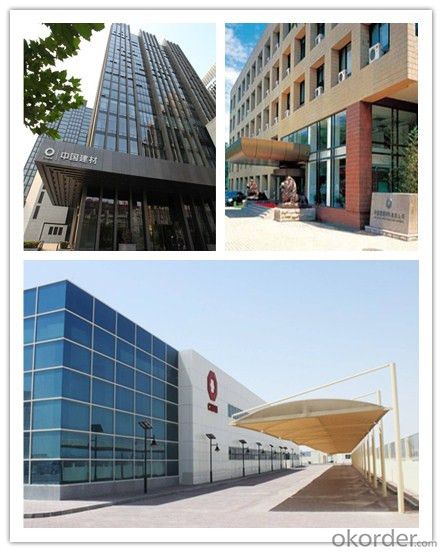
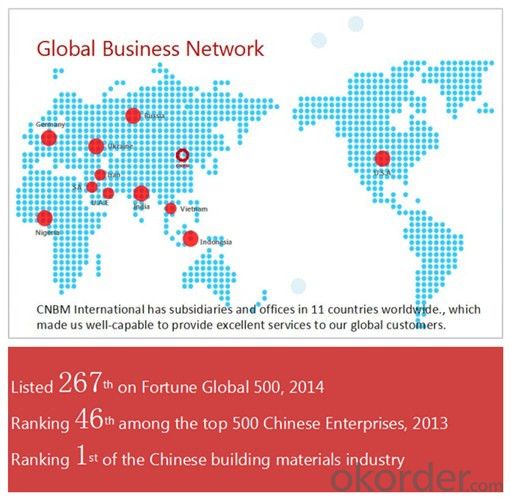
Delivery of the Galvanized Steel Coil Galvanized Steel Sheet GI
Packaging Detail | Sea worthy packing /as per customer's packing instruction |
Delivery Detail | 15 ~ 40 days after receiving the deposit |
Products Show
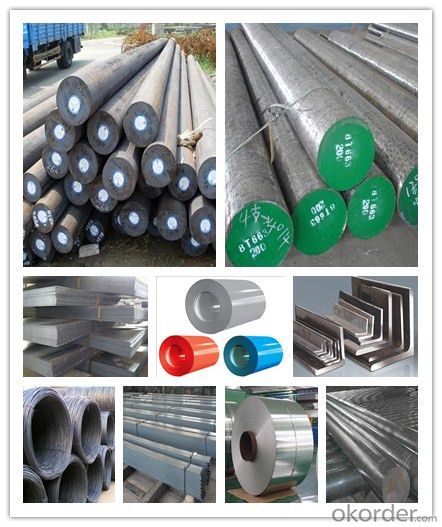
FAQ:
Are you a trading company or manufacturer? | Manufacturer |
What’s the MOQ? | 3 metric ton |
What’s your delivery time? | 15-35 days after downpayment received |
Do you Accept OEM service? | Yes |
what’s your delivery terms? | FOB/CFR/CIF |
What's the Payment Terms? | 30% as deposit,70% before shipment by T/T |
Western Union acceptable for small amount. | |
L/C acceptable for large amount. | |
Scrow ,Paybal,Alipay are also ok | |
Why choose us? | Chose happens because of quality, then price, We can give you both. Additionally, we can also offer professional products inquiry, products knowledge train (for agents), smooth goods delivery, excellent customer solution proposals. |
What's your available port of Shipment? | Main Port, China |
What’s your featured services? | Our service formula: good quality+ good price+ good service=customer's trust
|
Where are your Market? | Covering more than 160 countries in the world |
- Q: How does special steel perform in high-stress environments?
- Special steel performs exceptionally well in high-stress environments due to its unique properties. Its enhanced strength, durability, and resistance to corrosion make it highly reliable and capable of withstanding extreme conditions. This allows it to maintain its structural integrity and prevent deformation or failure, making it ideal for use in demanding industries like aerospace, oil and gas, and automotive.
- Q: What are the different methods for improving the tensile strength of special steel?
- There exists several approaches to enhance the tensile strength of special steel. 1. Alloying: Incorporating alloying elements like chromium, nickel, molybdenum, or vanadium into the steel is a widely used technique. These elements create solid solutions within the iron matrix, augmenting the steel's strength, hardness, corrosion resistance, and wear resistance. 2. Heat treatment: Employing heat treatment is another effective means to increase the tensile strength of special steel. Processes such as quenching, tempering, and annealing are commonly employed. Quenching involves rapidly cooling the steel from a high temperature, resulting in a hardened microstructure. Subsequently, tempering reduces brittleness and enhances the steel's toughness. Conversely, annealing necessitates heating the steel to a specific temperature followed by a slow cooling process, leading to the refinement of the grain structure and improved strength. 3. Cold working: Also referred to as cold rolling or cold drawing, cold working involves subjecting the steel to plastic deformation at low temperatures. This procedure elevates the dislocation density in the steel, resulting in strain hardening and improved strength. Cold working significantly enhances the tensile strength of special steel. 4. Grain refinement: Improving the grain structure of the steel can also enhance its tensile strength. This can be achieved through processes like recrystallization annealing, where the steel is heated to a specific temperature and gradually cooled to promote the formation of smaller and more uniform grains. Smaller grain size contributes to increased strength and improved mechanical properties. 5. Shot peening: Shot peening entails bombarding the steel's surface with tiny metallic or ceramic particles. This technique induces compressive stresses in the surface layer of the steel, inhibiting crack initiation and propagation. Ultimately, shot peening improves the steel's tensile strength and fatigue resistance. It is crucial to consider that the selection of the method to enhance tensile strength depends on the specific application and requirements of the special steel. Various combinations of these methods can be employed to achieve the desired mechanical properties.
- Q: What are the factors that can affect the machinability of special steel?
- The factors that can affect the machinability of special steel include the composition and microstructure of the steel, the cutting tool materials and geometry, cutting conditions such as cutting speed and feed rate, the presence of cooling and lubrication, and the stability of the machining setup.
- Q: Can special steel be used for making defense industry components?
- Yes, special steel can be used for making defense industry components. Special steel alloys possess superior strength, durability, and resistance to wear, making them ideal for manufacturing critical defense components that require high performance under extreme conditions. Additionally, special steel can be tailored to meet various specific requirements of defense applications, such as ballistic protection, corrosion resistance, and heat resistance.
- Q: What is the difference between special steel and regular steel?
- Special steel refers to steel that has been specially manufactured or treated to possess specific properties or characteristics that regular steel does not have. This can include higher strength, better corrosion resistance, improved ductility, or enhanced heat resistance. Regular steel, on the other hand, refers to the general classification of steel that is commonly produced and used in various applications without any specific modifications or unique attributes.
- Q: What are the different methods of heat treatment for special steel?
- There are several different methods of heat treatment for special steel, including annealing, normalizing, quenching, tempering, and case hardening. Each method involves heating the steel to a specific temperature and then cooling it in a controlled manner to achieve desired properties such as improved strength, hardness, toughness, or resistance to wear.
- Q: What are the characteristics of high-speed steel?
- High-speed steel (HSS) is known for its exceptional durability and heat resistance. It has excellent hardness, toughness, and wear resistance, making it suitable for cutting tools and machining applications. HSS can withstand high temperatures without losing its hardness, allowing it to cut at high speeds without losing its sharpness. Additionally, it has good dimensional stability and can maintain its shape even under extreme conditions.
- Q: How does special steel perform in corrosive environments?
- Special steel is specifically designed to perform exceptionally well in corrosive environments. It is resistant to corrosion caused by various factors such as moisture, chemicals, and high temperatures. This type of steel typically contains higher levels of alloying elements such as chromium, nickel, and molybdenum, which enhance its corrosion resistance properties. Additionally, special steel undergoes specific heat treatments and surface finishes to further improve its resistance to corrosion. Overall, special steel exhibits excellent performance and longevity in corrosive environments, making it a preferred choice in industries such as oil and gas, chemical processing, marine, and construction.
- Q: How is magnetic alloy steel used in the production of magnetic components?
- Magnetic alloy steel is used in the production of magnetic components due to its unique magnetic properties. It is commonly used to make permanent magnets, such as those found in electric motors, generators, and transformers. The alloy's high magnetic permeability and saturation induction make it ideal for creating strong magnetic fields. Additionally, its resistance to demagnetization and ability to retain magnetism at high temperatures make it suitable for various applications in industries like automotive, aerospace, and electronics.
- Q: How does special steel contribute to the packaging industry?
- Special steel contributes to the packaging industry by offering enhanced strength and durability to packaging materials and machinery. It helps in manufacturing high-quality packaging products with increased resistance to corrosion, impact, and wear, ensuring the protection and preservation of goods during transportation and storage. Additionally, special steel's versatility allows for the production of innovative packaging designs, enabling companies to create customized solutions that meet specific requirements and attract consumers.
Send your message to us
Galvanized Steel Coil Galvanized Steel Sheet GI
- Loading Port:
- Tianjin
- Payment Terms:
- TT OR LC
- Min Order Qty:
- 5 m.t.
- Supply Capability:
- 10000 m.t./month
OKorder Service Pledge
OKorder Financial Service
Similar products
Hot products
Hot Searches
Related keywords
